The Role of AI in Nursing
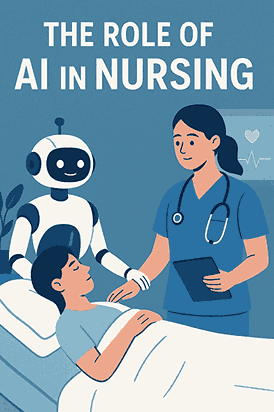
Introduction
Artificial Intelligence (AI) is transforming healthcare in ways that were once only imagined. From predicting diseases to assisting in surgeries, AI has become an essential part of modern medicine. However, one area that often goes unnoticed is its role in nursing. Nurses form the backbone of healthcare systems, and AI offers powerful tools to make their work more efficient, accurate, and patient-centered.
In this article, we will explore how AI supports nurses in daily practice, the challenges it presents, and the potential it holds for the future of healthcare.
Enhancing Patient Care
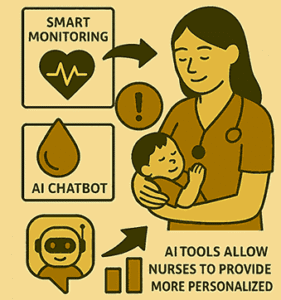
AI tools allow nurses to provide more personalized care. For instance, smart monitoring systems can track a patient’s vital signs in real-time. If any abnormal pattern appears, the system alerts the nurse immediately. This early warning helps prevent complications and improves patient outcomes.
Moreover, AI-powered chatbots can answer routine patient queries, freeing up nurses to focus on more complex tasks. As a result, patients receive timely responses while nurses reduce their workload.
Supporting Clinical Decision-Making
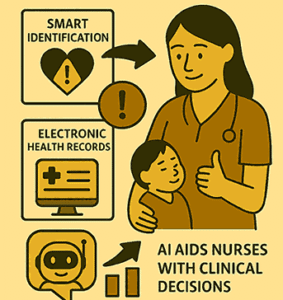
Decision-making is a critical part of nursing. Nurses often need to evaluate symptoms, review medical history, and decide on immediate actions. AI can analyze large amounts of patient data within seconds, providing insights that support quick and accurate decisions.
For example, AI can identify early signs of sepsis from electronic health records. With this information, nurses can act swiftly, potentially saving lives. Rather than replacing human judgment, AI strengthens it by offering evidence-based suggestions.
Improving Documentation and Administrative Work
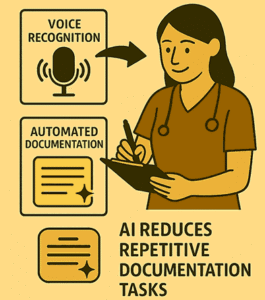
Nurses spend a significant amount of time on documentation. Recording patient histories, updating charts, and writing reports can consume hours each day. AI-driven systems can automate much of this work through voice recognition and predictive text.
By reducing paperwork, nurses spend more time where they are most needed—at the patient’s bedside. This shift not only improves care but also reduces stress and burnout among nursing staff.
Training and Education
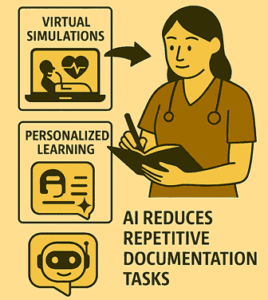
AI also plays a growing role in nursing education. Virtual simulations powered by AI allow nursing students to practice real-life scenarios in a safe environment. These simulations replicate patient conditions, enabling students to learn decision-making skills without risk.
Additionally, AI-based learning platforms personalize training for each student. They identify areas where learners struggle and provide targeted support, making education more effective and engaging.
Addressing Nurse Shortages
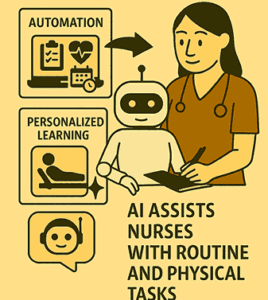
Healthcare systems worldwide face a shortage of nurses. AI helps bridge this gap by automating routine tasks such as scheduling, reminders, and patient follow-ups. This allows the available nursing workforce to handle more patients without compromising quality.
Robotics powered by AI also assist nurses with physical tasks such as lifting patients or delivering medication. While these machines do not replace human touch, they reduce the physical strain on nurses and lower the risk of injury.
Ethical Considerations and Challenges
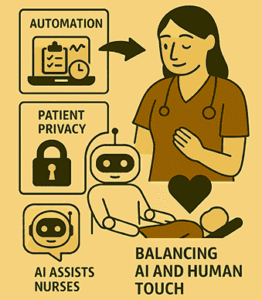
Despite its benefits, AI in nursing raises important ethical questions. Patient privacy is one major concern. AI systems handle sensitive health data, which must be protected against breaches. Nurses must ensure that AI tools comply with data protection laws and maintain confidentiality.
Another challenge is maintaining the human element in healthcare. Compassion, empathy, and personal connection cannot be replaced by technology. Nurses must strike a balance—using AI for efficiency while continuing to provide emotional support to patients.
The Future of AI in Nursing
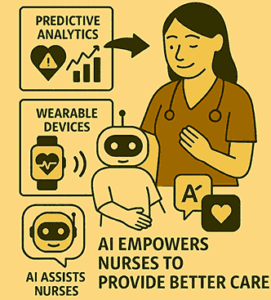
Looking ahead, AI promises to become an even stronger ally for nurses. Predictive analytics may soon allow nurses to identify high-risk patients before problems arise. Wearable devices powered by AI could continuously monitor patients at home, sending updates directly to nurses.
In addition, AI-driven translation tools will help nurses communicate with patients from diverse linguistic backgrounds. This will ensure equal care for all, regardless of language barriers.
The future points toward collaboration rather than competition. AI will not replace nurses; instead, it will empower them to deliver higher-quality care with fewer errors and greater compassion.
Conclusion
AI is revolutionizing nursing by improving patient care, supporting decisions, reducing administrative burdens, and enhancing education. While challenges like data privacy and over-reliance on technology remain, the benefits far outweigh the risks.
Ultimately, the role of AI in nursing is not to take away the human touch but to strengthen it. By allowing nurses to focus more on empathy and patient interaction, AI ensures that healthcare remains both modern and humane.


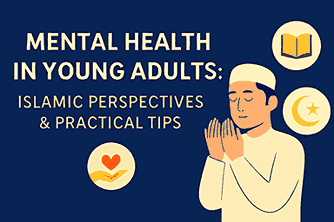


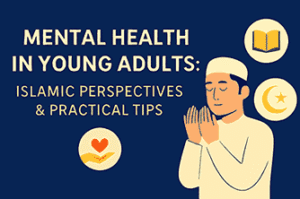


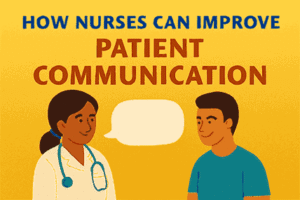




Post Comment